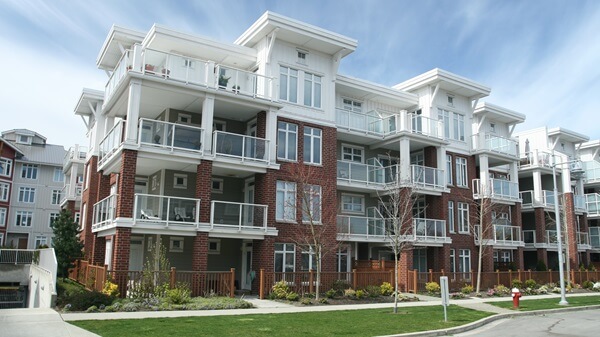
If you live outside British Columbia you must have wondered, what is a strata property? What does it mean to live in strata in BC? or What Is the difference between condo and strata?
The block of land or the land title is what you buy when you buy a house.
On the other hand, when you purchase a property that is a part of a stratum title, you become the joint owner of the unit, flat or townhouse (referred to as the lot) as well as the so-called “common property,” which includes things like entrance halls, lifts, gardens and swimming pools. All building property owners have a shared duty for these regions.
Although residential townhomes and apartments are the most prevalent types of strata title but what does strata mean in BC? They can also be found in retail, retirement communities, serviced apartments, and commercial spaces.
Table of Contents
How is the Definition of a Stratum Arrived at?
The crucial question at hand is how to distinguish between a stratum and other objects. What is the difference between condo and strata? The dimensions? The measurements?
The short answer is that you cannot determine something just by observing a property’s outward appearance. Rather, you need to inquire about the property’s governing and legal framework. If a property has been classified as strata, the developers would have filed the designation with the Land Title Office.
What Does Strata Property in British Columbia Mean?
Before we dig into other questions, let’s take a jibe at what does strata mean in BC?
It means properties are a well-liked option for living due to its affordability, convenience, security, and extra facilities. Approximately 1.5 million individuals reside in stratum housing. Condos, townhomes, duplexes, and even single-family homes in bare land strata corporations (sometimes known as “strata subdivisions”) are examples of strata housing and what does it mean to live in strata property.
Strata living is a popular alternative in British Columbia. Living in strata housing entails distinct obligations and responsibilities; it differs from renting any apartment or buying condos for sale in Toronto, that are not part of a strata organization.
How Do Strata Title Properties Operate in Practice?
If you’re thinking about buying your first unit or flat, you might be wondering how stratas work and what does it mean to live in a strata? You may not be familiar with this way of life. Owning a lot within a strata title property differs significantly from owning a free-standing house or building.
For starters, each scheme has its own set of rules known as by-laws, which lot owners/occupants must follow regardless of whether they agree with them. Owners and inhabitants must comply with regulations on the display and improvement of their property, as well as any activity that may impact other residents.
In strata properties, you own a specific unit or lot as well as a portion of the common amenities, which include stairways, common gardens, and other communal spaces.
You are the single proprietor of your unit or lot property. This ownership includes domestic items including appliances, furniture, and fixtures. Internal walls and doors could also be included.
Can You Tell the Difference Between a Strata and a Condominium?

If the terminology seems a little confusing to you—and who isn’t? —know that ownership of a condominium and a stratum are synonymous. The Australians, who passed strata title laws in the 1960s, are the ones who accidentally coined the phrase, which BC has used ever since.
1. Living in a Condo
A condominium is a kind of property ownership that enables a person to possess a single unit inside a big complex. These multi-unit buildings are often apartment complexes where residents share common areas and amenities but own individual flats.
The buyers of these apartments are the owners of everything inside, up to and including the walls that make up the unit’s perimeter. Elevators, swimming pools, hallways and other possible amenities are examples of common areas.
The amount of money that condos for sale in Toronto collect covers the cost of amenities, repairs, and landscaping; an increase in expenditures would also result in an increase in condominium fees.
2. Life in a Strata
Essentially, the terms “condo” and “strata” are interchangeable—that is, unless you live in Australia or British Columbia, Canada, where the latter term has been expanded to include townhouses, one must ask what is the difference between a strata and condo?
The word “strata” is thought to have come from the word “layers” in geology. Buildings with two or more levels (or layers) were referred to as strata when they were first adopted. The principle of independently owned units with shared common areas is still present in strata, nevertheless.
Strata Property: Beyond Condominiums
Condos or condominiums are common terms used to describe strata housing which is like living in a condo but what that means living in strata in BC, specifically.
Nevertheless, strata housing can also refer to single-family homes in bare land strata corporations, sometimes known as “strata subdivisions,” duplexes, townhouses, and fractional vacation properties. It also includes apartment-style condominiums.
In A Nutshell
Secret unlocked about what is a strata property?
Strata projects come in a variety of forms, such as bare land, commercial, residential, industrial, or mixed-use. It is crucial for those who are renting or buying strata property to comprehend the legal requirements and how they apply to them.
Related Articles
- Can Foreigners Buy Commercial Property in Canada
- Can Canadians Buy Property in USA
- How to Get a Copy of Property Deed in Ontario
We are aware that it can be overwhelming to learn about the specifics of the stratum world. Condo Player can assist with that. Speak to us and seal the deal!

My name is Adnan Khan and I am a realtor specializing in Pre-construction condos and homes sales.
I also do assignments of condos. You can contact me at 416-897-4714
Designation: P.Eng
Education: McMaster University, Engineering Technology
Specialty: Residential Real Estate
Experience: 15+
Area Covered: Downtown Toronto and Neighboring Area
Languages Spoken: English, Urdu





Leave a Reply